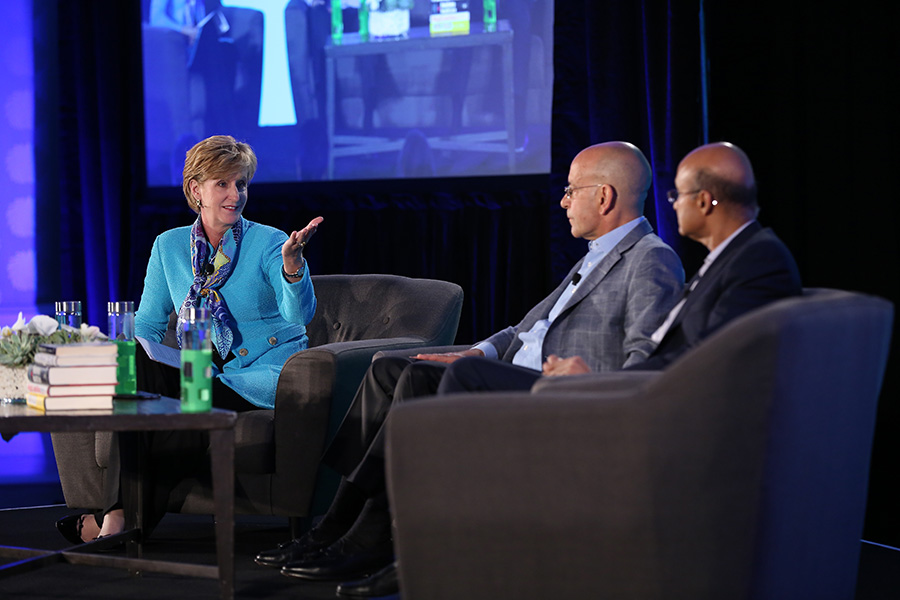As CEO of Premier, Susan DeVore sits atop a company that provides technologies for a range of initiatives, from analytics to quality improvement. In between are finance, pharmacy, supply chain and population health.
DeVore is also member of the board of directors for AdventHealth, Unum Group, the Healthcare Leadership Council, Coalition to Protect America’s Health, the Institute of Medicine Roundtable on Value and Science Driven Healthcare, among others.
Health Evolution Editor-in-Chief Tom Sullivan interviewed DeVore about CEO’s higher calling to fix the system, how innovation has advanced medicine more than care delivery, the mindset shift needed for population health, and more.
Health Evolution: You’ve said that the health care industry has a higher calling to improve the U.S. system. How does that inform how you operate as a leader?
DeVore: In my role, I’ve seen healthcare at its best. In most cases, providers are doing great work and delivering tremendous innovation in the practice of medicine. Our treatments have come leaps and bounds from where they were just 10 years ago. The issue is that we haven’t seen a similar transformation in the systems of care delivery. Nor have we seen those innovations result in lower total costs. That’s the next frontier. Because a system of great care isn’t great for everyone if it’s not affordable. Or if it’s delivered in a system that is not error free and hardwired for reliability.
Health care is the economic, social and policy issue of our time. Getting it right affects all our lives – personally – and will help ensure that our healthcare investments don’t turn into an anchor that drowns our government and our patients in debt.
Health Evolution: It’s an interesting point about how innovation has advanced the practice of medicine more so than care delivery. How as a CEO are you working to change that particularly given your viewpoint about health care being the paramount issue today?
DeVore: As a leader, I view it as my responsibility to create a corporate culture that increases our chances of achieving this mission. Our success can’t only be measured by a financial analyst looking at a balance sheet. Equally important to our results is our ability to drive impactful change on behalf of our members. Better quality care at a lower cost resulting in better outcomes for patients. That is the point of reference I use as my North Star.
Health Evolution: Looking a little further into the future now, what are your top priorities for the next three to five years?
DeVore: In my view, the largest issue in front of us is change management. We all know healthcare needs to evolve and change. But some of the developments we’re pushing toward represent a seismic shift. The move toward population health, for instance, requires a fundamental mindset reorientation that can be difficult to square when you’ve been practicing healthcare a certain way, for decades. Imagine the change in a CFO’s mind when they are told to stop pushing for “heads in beds” and optimal throughput, and instead must work toward the opposite effect. One of our members put it best when he said “I know we’re doing a good job when we have to close hospitals” because it means that the population health has improved to the point where acute care services are needed less frequently. That’s a big shift. And it seems counterintuitive at first blush.
Health Evolution: What in your mind is driving that longer-term shift away from optimal throughput?
DeVore: We have about 11,000 baby boomers aging into Medicare every day. And what that means is an added strain on the federal budget to provide these people with care, and added strain on the health systems that will have to provide care on a Medicare budget – which reimburses only about 89 cents on the dollar for the total cost of care. That means preparing today to live on the Medicare payment rate. And that means a total cost management approach that is extremely judicious about every expenditure – we call it holding every penny prisoner. Going after every source of waste and inefficiency and weeding it out, cutting any and all duplication, streamlining administration, using the most efficacious and cost-effective supplies, not providing care that has no demonstrable positive outcomes, to name a few. It’s a tall order, but necessary for long-term sustainability.
Health Evolution: What other substantial changes do you see coming down the pike?
DeVore: We really need to get a firm handle on things is the world of prescription drugs. For years, we’ve had an unhealthy market that requires more competition and regulatory nimbleness to address. To date, we’ve had limited success in getting more competition within this segment of health care, but there are some encouraging signs on the horizon. This administration has made it clear that one way or another, drug prices will be coming down. Devil will be in the details, and we’ll see if the solutions are workable.










